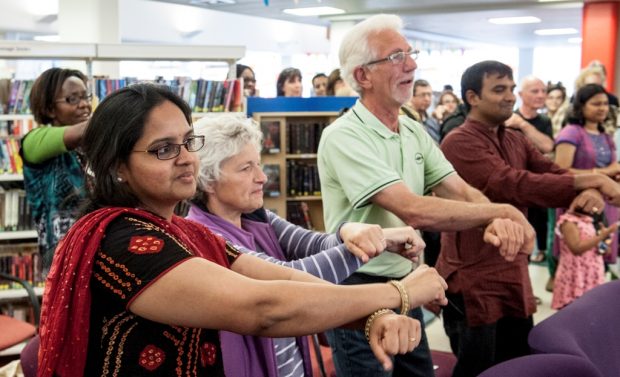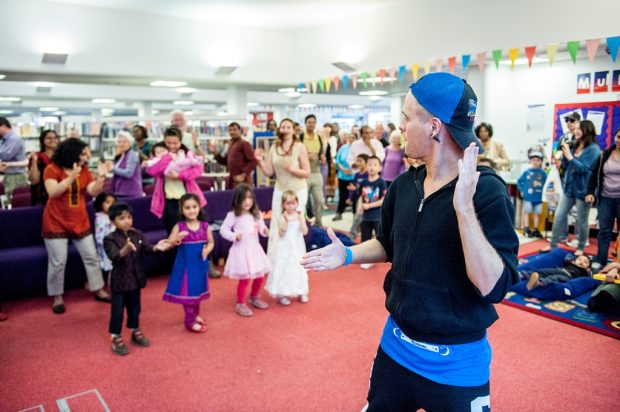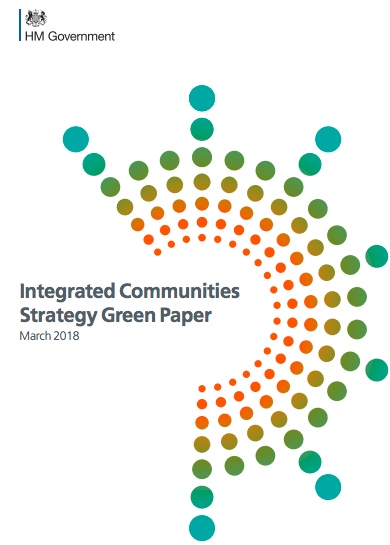If you read our blog about the 4 October Taskforce meeting in Canning Town, you’ll have seen that we talked about a presentation given by colleagues from the Ministry for Housing, Communities and Local Government (MHCLG - formerly DCLG). They were working on producing a Green Paper on social integration, building on a number of themes pulled out from the Casey Review focussed on combating social exclusion, particularly in deprived areas.
They’d been talking to the Taskforce team about the wonderful work already underway in a number of library services across the country to support and develop social mixing and trust between different communities. We discussed the fact that library services were fundamentally committed to supporting strong communities, with the Ethics of Librarianship explicitly supporting equity, impartiality, and respect for diversity, equal opportunities and human rights. We talked about how libraries can build and reinforce a sense of place, often as part of broader place-making partnerships, with the unifying benefits that this can lead to. And we also discussed how bringing diverse groups and individuals together physically through libraries can contribute to building trust and understanding.

The Taskforce was keen to see the Green Paper help to align government policy priorities more cohesively, so that library service resources could be planned and targeted more accurately to maximise impact. It was glad to see that the Integrated Strategy team seemed to be thinking positively about the importance and relevance of libraries to achieving strong and cohesive communities.
What does the Integrated Communities Green Paper say about libraries?
The Green Paper was published earlier today (14 March) and we were pleased to see that libraries’ current work on supporting and building communities, and their efforts in supporting social integration was fully acknowledged and celebrated. Work in Suffolk on Chat and Chill sessions, bringing people from different communities - explicitly migrant families - together was chosen to feature as a case study [page 46].

And the Green Paper goes on to encourage building on the great work that’s already being done by challenging libraries and community hubs to extend the work they do on this important issue - which echoes our Ambition challenge to both central and local government, to ‘think libraries first’ in delivering services to local communities.
What happens next?

The Integrated Communities Strategy green paper invites views on the government’s vision for building strong integrated communities where people – whatever their background – live, work, learn and socialise together, based on shared rights, responsibilities and opportunities.
The green paper sets out an ambitious programme of actions which will take place across government to deliver this vision at the local and national level. One element is around Integration Areas. The strategy set out a new localised approach to integration which will be trialled initially in five areas. The team will work with local authorities and a wide range of other partners to co-design local integration strategies to take tailored actions to address the challenges specific to their place. These strategies will build on existing good practice at local level, local knowledge and expertise, and the strength of community assets.
They have invited 5 local authorities to be the first Integration Areas:
- Blackburn with Darwen
- Bradford
- Peterborough
- Walsall
- Waltham Forest
The MHCLG want to hear from individuals, communities and organisations about the most effective ways to address integration challenges, and this page sets out a number of different ways in which you can share your views. There is an online survey or a form, or you can email the team directly. Do let them know about the successful work your library service is doing.
Meanwhile, the Taskforce is looking at making this issue a focus for development over the coming period; gathering and assessing good practice case studies and evidence; and starting to put this issue more firmly on the agenda for all library services. We’ll be updating our Longer-term, evidence-based sustainable planning toolkit to link to the Green Paper and help library services and those involved in broader council strategy work understand how they can ensure that the potential contribution of libraries to social integration and community cohesion is fully exploited. We also look forward to making contact with library services in the Integration Areas described above, to find out how they will become part of the new approach.
We’ll also be looking for opportunities to use what the Green Paper says to boost recognition with decision makers in both central and local government about what libraries can contribute to achieving these important strategy aims. And if you have examples of work your library service is doing in your own area on this sort of issue, please let us know about it by emailing librariestaskforce@culture.gov.uk, so we can gather and then share good practice across the sector and beyond.